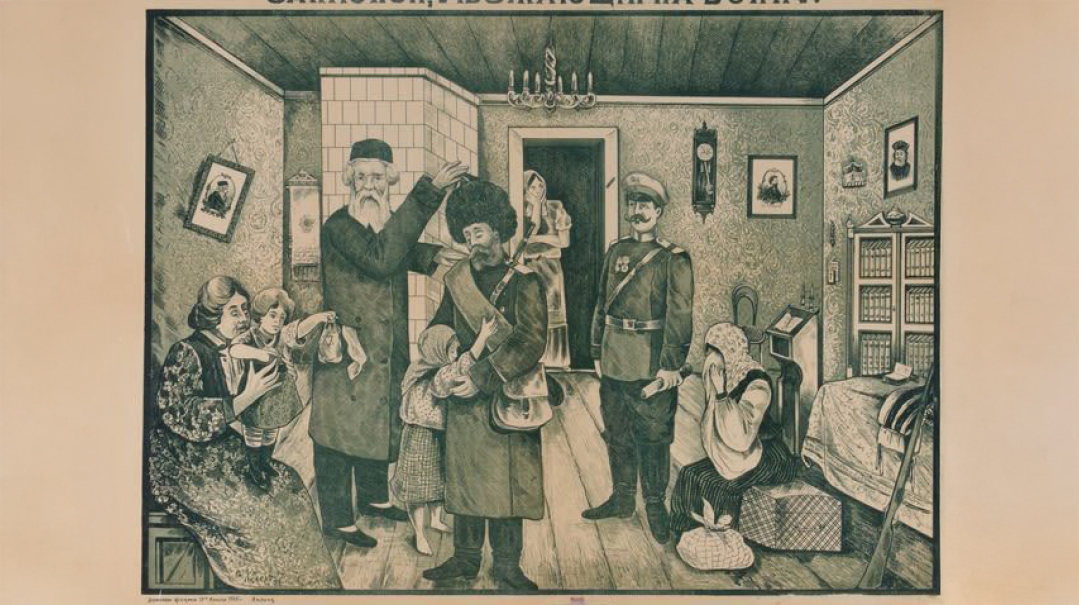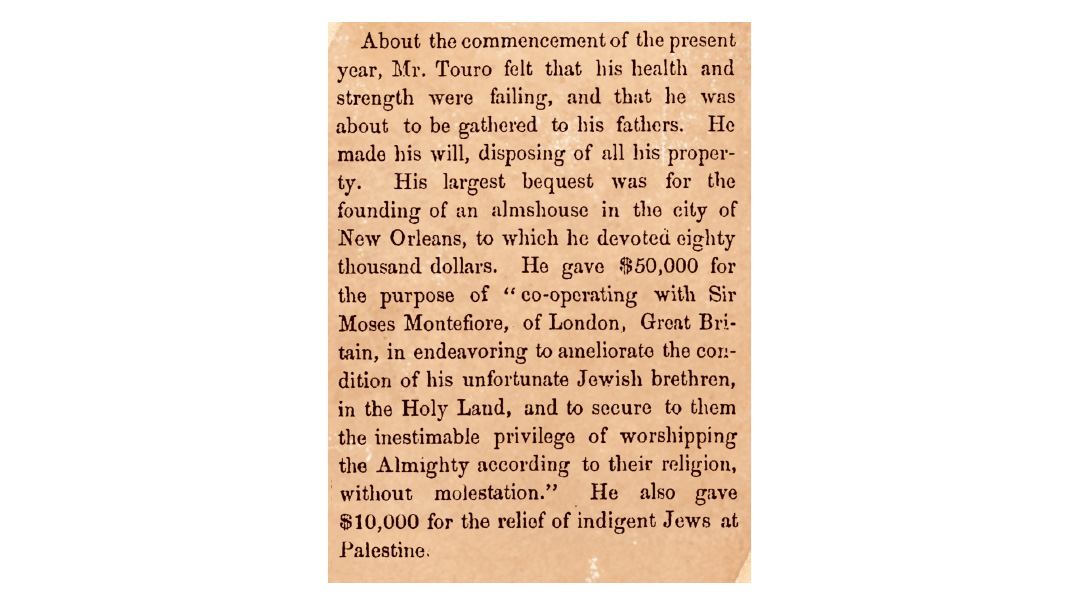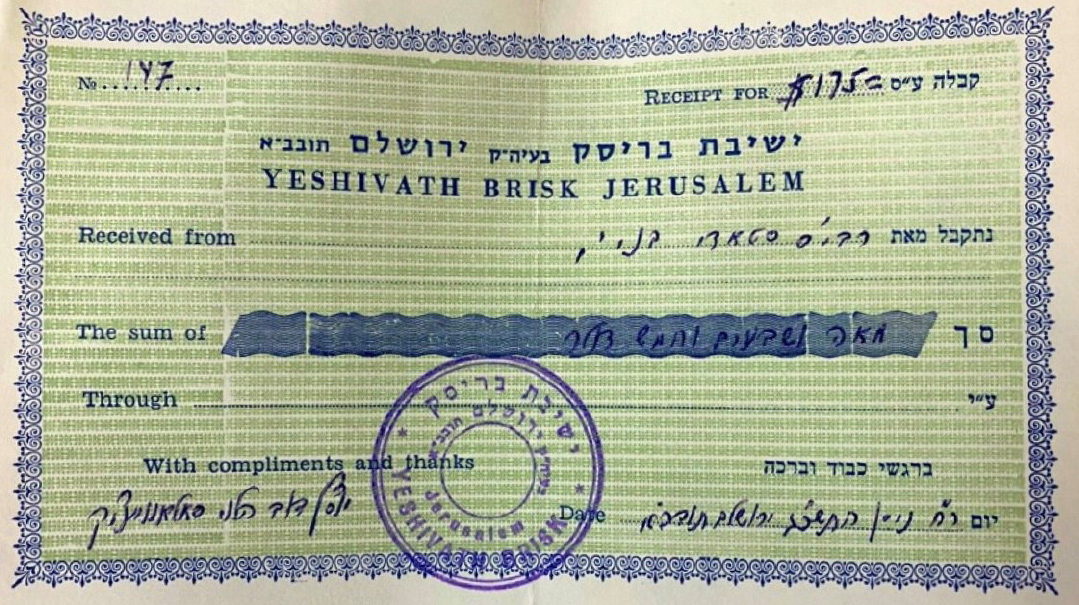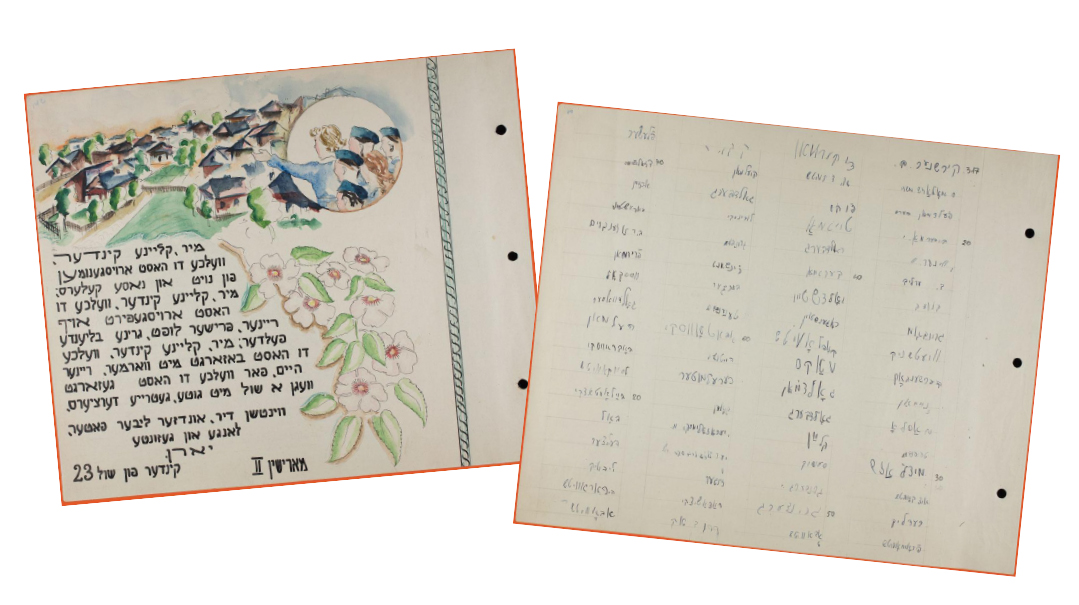Chief Contender
| September 10, 2024Warsaw’s Okopowa Jewish cemetery is one of the largest in the world
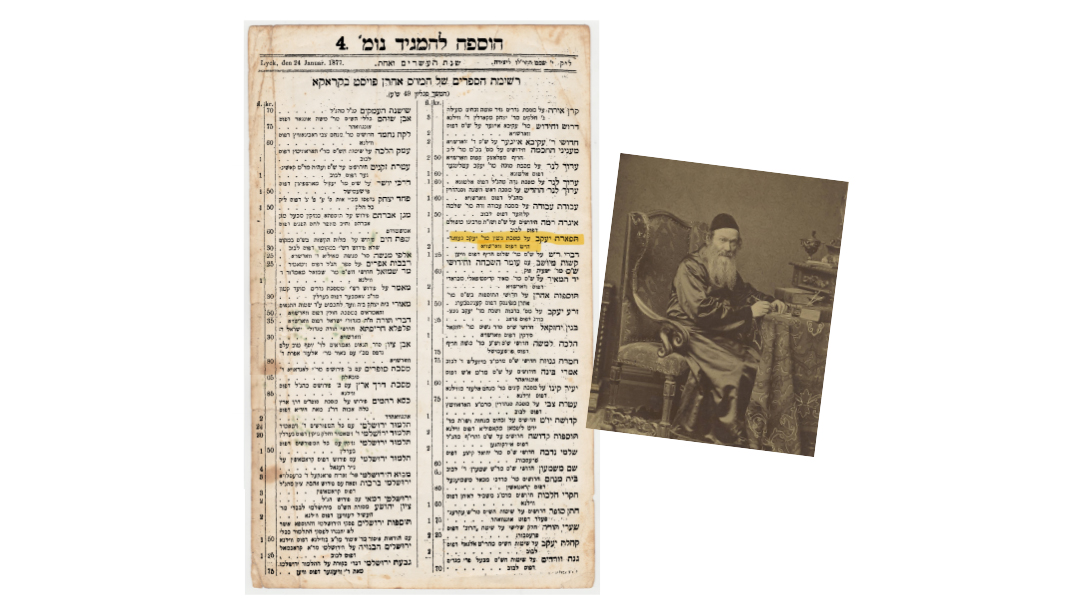
A Krakow seforim store’s 1877 advertisement in HaMaggid includes Rav Yaakov Gesundheit’s magnum opus Tiferes Yaakov
Title: Chief Contender
location: Warsaw, Poland
Document: HaMaggid
Time: January 1877
Rav Yaakov was a righteous king, and deserving of his royal position as chief rabbi of Warsaw. But the people of Warsaw weren’t worthy of his leadership or of benefiting from the light radiating from him. It should be stated here that he remained the rav of Warsaw, even after the evil ones of the city removed him from his formal position as chief rabbi. He is rightly considered the rav of Warsaw, and in the World of Truth they are currently greeting him as the rav of Warsaw.
—Rav Yosef Dov HaLevi Soloveitchik, the Beis HaLevi, in his hesped for Rav Yaakov Gesundheit
Warsaw’s Okopowa Jewish cemetery is one of the largest in the world. Near the cemetery entrance lies the chelkas harabbanim, dominated by the great rabbis of the city. The large ohel of Warsaw’s first chief rabbi, Rav Shlomo Zalman Lifschitz, the author of Chemdas Shlomo, looms over the others.
The graves of Rav Aryeh Leib Tzuntz, the Gaon of Plotzk; Rav Chaim Davidsohn; Rav Dov Ber Meizlish; Rav Yitzchak Feigenbaum; Rav Tzvi Hirsh Perlmutter; Rav Nosson Spiegelglass; Rav Avraham Luftvir, the young son-in-law of Rav Meir Simcha of Dvinsk; and many others offer silent testimony to the glorious Torah legacy of what was once the world’s largest Jewish community.
Just to the left of the Chemdas Shlomo’s ohel is the modest headstone of the last official chief rabbi of Warsaw — Rav Yaakov Gesundheit, author of the highly acclaimed Tiferes Yaakov on Shulchan Aruch and masechtas Chullin and Gittin. Despite his memorable last name, Rav Yaakov was immortalized by the name of his seforim, Tiferes Yaakov. His sefer on Gittin remains a very popular sefer utilized in yeshivos worldwide till this very day.
Following the passing in 1854 of the second chief rabbi of Warsaw, Rav Chaim Davidsohn, a conflict broke out between the city’s two religious factions. The chassidic community submitted the candidacy of Rav Yitzchak Meir Alter, better known as the Chiddushei Harim and later the first Gerrer Rebbe, who resided in Warsaw for most of his life and was known widely as the “Varshaver Illui.” The misnagdic community submitted the candidacy of a brilliant local talmid chacham and Warsaw native named Rav Yaakov Gesundheit.
Though the two communities had a somewhat acrimonious relationship, Rav Yaakov Gesundheit and the Chiddushei Harim were close friends and held each other in high esteem. When the Chiddushei Harim passed away in 1866, Rav Yaakov Gesundheit accompanied the levayah and cried out, “The chassidim will find a new rebbe, but we have no one to turn to now, because he is irreplaceable!”
Rav Yaakov Gesundheit and the Chiddushei Harim were prime disciples of the Plotzker Gaon, Rav Aryeh Leib Tzuntz, who established the first yeshivah in Warsaw. Upon Rav Tzuntz’s passing in 1833, Rav Yaakov succeeded him as a rebbi in the yeshivah at age 17, and continued teaching Torah in Warsaw for the next 55 years until his own passing. Refusing to support himself through a Torah position, he engaged in business and became one of Warsaw’s wealthiest Jews, distributing most of his funds to needy Torah scholars. In 1837, Rav Akiva Eiger made an extended visit to Warsaw, and Rav Yaakov Gesundheit enjoyed a close relationship with him during this time.
To forestall Rav Yaakov Gesundheit’s appointment as chief rabbi, Warsaw chassidim joined forces with the powerful integrated (and less traditional) community to support the candidacy of an outside compromise candidate, Rav Dov Ber Meizlish, then serving as rav of Krakow. Upon the latter’s passing in 1870, Rav Yaakov Gesundheit’s candidacy was again put forward by the misnagdic faction. His name and two others’ were submitted to the local Polish authorities, the ultimate arbiters for who would serve in the official position of chief rabbi. Following a tense period of behind-the-scenes advocacy by communal leaders representing each faction, the Polish government appointed Rav Yaakov Gesundheit to the position of chief rabbi of Warsaw at a formal ceremony in city hall.
His opponents were unwilling to concede defeat, and they tried to have him removed from his position. They submitted baseless claims that he had declared bankruptcy more than once, causing financial damage to others, and was therefore unfit for the position. They also charged that he was religiously conservative, against progressive forms of Judaism or any changes to the educational curriculum of Torah institutions.
This dragged on for about four years, until he was officially removed from his position as chief rabbi in late 1873. Despite the loss of official recognition, he continued serving in an unofficial capacity as the leading rabbi for most of the community until his passing in 1878.
During Rav Yaakov Gesundheit’s final years, the Beis HaLevi, Rav Yosef Dov HaLevi Soloveitchik, settled in Warsaw. They became close friends, and Rav Yaakov was mesader kiddushin at the Beis HaLevi’s third marriage.
During the dispute over the Warsaw rabbinate, the Beis HaLevi emerged as a very vocal supporter of Rav Yaakov Gesundheit. The Beis HaLevi had moved to Warsaw following his exit from the Slutzk rabbinate, which resulted from his standing up to the kahal elite to defend the city’s poor.
Rav Yaakov quipped to his friend, “We’re both in a similar situation. You’re the official rabbi of Slutzk, without actually serving as rav anymore, while I am serving as rav without the official title of rabbi of Warsaw.”
There was even a joint attempt by Rav Yaakov Gesundheit and the Sfas Emes of Ger to appoint the Beis HaLevi as av beis din of Warsaw, with the Sfas Emes guaranteeing the support of the chassidic community, but this was thwarted by secular elements.
Tens of thousands attended Rav Yaakov Gesundheit’s levayah after he succumbed to tuberculosis in 1878. As a giant in Torah who had served his community with dedication, performing myriad acts of chesed and tzedakah, his legacy in the Warsaw Torah community lasted until its destruction in the Holocaust.
For Health
His descendant and namesake Yaakov Gesundheit was born in Warsaw and became a wealthy industrialist in South Africa before immigrating to Tel Aviv in 1926. His villa was known as the largest in Tel Aviv, and included a shul and mikveh. He also established the Gesundheit Library of Torah works, named in memory of his illustrious ancestor. He was one of the great philanthropists of his day, supporting a wide array of Torah and chesed causes. One of his largest bequests was a building for a beis medrash and dormitory for the nascent Ponevezh Yeshivah, aptly named Tiferes Yaakov.
Hail to the Chief
Following the protracted dispute over the position of chief rabbi of Warsaw, the Russian government in St. Petersburg ordered that the position be terminated entirely. There would never again be a chief rabbi of Warsaw. There were rabbis of neighborhoods, dayanim, and an av beis din, but Rav Yaakov Gesundheit was the last chief rabbi of the city.
On September 25, 1878, Hamaggid reported on the large Warsaw funeral of former chief rabbi Rav Yaakov Gesundheit:
Warsaw, Wednesday, 13th of Elul.
The sound of lamentation is heard, the noise of the city, the voice of Yaakov, mourning for the glory of Yaakov that is shattered, and for the crown of Israel’s glory that is lifted and removed, for the splendor of our city has been taken away, the pride of our strength has perished, the joy of our hearts has ceased. This is none other than the great and righteous Rabbi Yaakov Gesundheit, of blessed memory, the author of the book Tiferes Yaakov, who is no longer among the living...
Besides being a Torah scholar, possessing all the qualities with which the Torah is acquired; besides his righteousness, his integrity, his kindness, and his great humility; besides his love for truth and refusal to show favoritism when it conflicted with the truth, he did not favor any person in judgment and hated bribery. His heart was open as wide as a hall, and he was knowledgeable in all aspects of Torah, both early and later authorities. Scripture, Mishnah, halachah, and aggadah — small matters and great matters alike — all were fluent on his lips, and he was as wise as the sages of the land who have made a name for themselves.
Rabbi Yaakov Gesundheit, of blessed memory, was born in this city, from a distinguished family in Israel. From his youth, at the age of sixteen, he became the head of a yeshivah, leading the community on the tranquil waters of Torah without compensation, dedicating himself to the service of Torah all his days. He was particularly diligent in teaching and raised hundreds and thousands of students, many of whom became great rabbis and halachic authorities in Israel. He was wealthy and an honest merchant in the land, performing the righteousness of G-d and showing kindness to the poor, giving bread to the hungry and money to the needy, considering wealth only as a means to do good and to show kindness to his people. ...
When the news spread throughout the city that their teacher and rabbi, Rabbi Yaakov Gesundheit, of blessed memory, had passed away, approximately ten thousand people quickly gathered and stood in shock at the corners of Franciszkańska and Nalewki streets, waiting for the moment when he would be taken from the holy place to travel the way of all the earth. When they carried him out of the house, the people immediately removed the horses from the carriage and placed the coffin in the carriage. His many students led the carriage slowly to the cemetery.
The procession was immense; all the shops were closed, and the streets of the city were filled only with mourning and wailing. At the cemetery, Rabbi Yosef Dov Baer HaLevi, the great rabbi of Slutsk, delivered a bitter eulogy over him, crying out in deep lamentation, and all the people wept and shouted: “Where is the pious one! Where is the humble one! Where is the light, and where is the splendor! Where is the Torah teacher, who will teach now? Where is the master, who will judge righteously?”
They dug his grave among the choicest graves, next to the grave of the great Rabbi Shlomo Zalman of Nasielsk, of blessed memory, the author of Chemdas Shlomo, who was also the rabbi of this city.… May G-d console his esteemed wife, the Rebbetzin, who remains a sad and lonely widow, and his four precious and righteous sons… and his three precious and refined daughters, may they live, and may we find consolation only in the precious books he published and the blessings he left behind in his writings. These include new and valuable writings on the three sections of Shulchan Aruch — Yoreh Dei’ah, Even HaEzer, and Choshen Mishpat — as well as responsa on practical halachah.
The yahrtzeit of the Tiferes Yaakov, Rav Yaakov Gesundheit, is 13 Elul.
For tours of Warsaw, or of any other location of Jewish history heritage in Europe or worldwide, contact Yehuda Geberer: yehuda@yehudageberer.com.
(Originally featured in Mishpacha, Issue 1028)
Oops! We could not locate your form.


